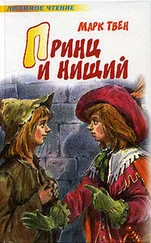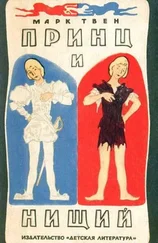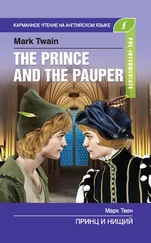Hendon was watching the king (Хендон наблюдал за королем). He said to himself (он сказал себе), with satisfaction (с удовлетворением), 'His disorder mendeth (его умственное расстройство проходит; to mend — чинить, поправиться); he hath changed (он изменился), and groweth gentler (и становится мягче; to grow — расти; становиться). If he had followed his wont (если бы он следовал своему обыкновению), he would have stormed (он бы бушевал = наорал) at these varlets (на этих негодяев), and said he was king (и сказал бы, что он король), and commanded (и приказал бы) that the women be turned loose unscathed (чтобы женщины были отпущены невредимыми). Soon his delusion will pass away (скоро его мания пройдет прочь; delusion — заблуждение, иллюзия, ложное представление) and be forgotten (и будет забыта), and his poor mind (и его бедный разум) will be whole again (будет целым = здоровым снова). God speed the day (Бог да ускорит = приблизит этот день)!'
That same day (в тот же самый день) several prisoners were brought in (несколько заключенных были привезены; to bring — приносить, привозить) to remain overnight (чтобы остаться на ночь), who were being conveyed (которых конвоировали), under guard (под стражей), to various places in the kingdom (в различные места в королевстве), to undergo punishment (чтобы подвергнуться наказанию) for crimes committed (за преступления совершенные). The king conversed with these (король поговорил с этими = с ними) — he had made it a point (он сделал это смыслом = он нарочно), from the beginning (с самого начала), to instruct himself (просвещать = просвещал себя) for the kingly office (для королевской должности) by questioning prisoners (расспрашивая узников) whenever the opportunity offered (когда ни представится возможность; to offer — предлагать) — and the tale of their woes (и рассказ об их бедах) wrung his heart (терзал его сердце; to wring — крутить, скручивать, выламывать; терзать). One of them (одна из них) was a poor half-witted woman (была бедная полоумная женщина) who had stolen a yard or two of cloth (которая украла ярд или два = ярд-другой ткани) from a weaver (у ткача) — she was to be hanged for it (она /должна/ была быть повешена за это; to hang — вешать). Another was a man (другой был человек) who had been accused (который был обвинен) of stealing a horse (в краже лошади; to steal — красть); he said the proof had failed (он сказал, что свидетельские показания провалились = не подтвердились), and he had imagined (и он вообразил) that he was safe from the halter (что он был в безопасности от веревки; safe — находящийся в безопасности); but no (но нет) — he was hardly free (он был едва свободен) before he was arraigned (прежде чем он был привлечен к суду; to arraign — привлекать к суду) for killing a deer (за убийство оленя) in the king's park (в королевском парке); this was proved (это было доказано; to prove — доказывать) against him (против него), and now he was on his way (и теперь он был на пути) to the gallows (на виселицу). There was a tradesman's apprentice (там был подмастерье ремесленника) whose case particularly distressed the king (чье дело особенно огорчило короля); this youth said (этот юнрша сказал) he found a hawk one evening (что он нашел ястреба одним вечером; to find — найти) that had escaped from its owner (который убежал от своего владельца), and he took it home with him (и он взял его домой с собой; to take — брать), imagining himself entitled to it (воображая себя имеющим на это право; to entitle — давать право); but the court convicted him (но суд признал его виновным) of stealing it (в краже его), and sentenced him to death (и приговорил его к смерти).
fought [fO:t], tumult [`tju:mAlt], arraign [ə`reın]
Now, by command, the masses parted and fell aside, and the king saw a spectacle that froze the marrow in his bones. Fagots had been piled about the two women, and a kneeling man was lighting them!
The women bowed their heads, and covered their faces with their hands; the yellow flames began to climb upward among the snapping and crackling fagots, and wreaths of blue smoke to stream away on the wind; the clergyman lifted his hands and began a prayer — just then two young girls came flying through the great gate, uttering piercing screams, and threw themselves upon the women at the stake. Instantly they were torn away by the officers, and one of them was kept in a tight grip, but the other broke loose, saying she would die with her mother; and before she could be stopped she had flung her arms about her mother's neck again. She was torn away once more, and with her gown on fire.
Two or three men held her, and the burning portion of her gown was snatched off and thrown flaming aside, she struggling all the while to free herself, and saying she would be alone in the world now, and begging to be allowed to die with her mother. Both the girls screamed continually, and fought for freedom; but suddenly this tumult was drowned under a volley of heart-piercing shrieks of mortal agony. The king glanced from the frantic girls to the stake, then turned away and leaned his ashen face against the wall, and looked no more. He said, 'That which I have seen, in that one little moment, will never go out from my memory, but will abide there; and I shall see it all the days, and dream of it all the nights, till I die. Would God I had been blind!'
Hendon was watching the king. He said to himself, with satisfaction, 'His disorder mendeth; he hath changed, and groweth gentler. If he had followed his wont, he would have stormed at these varlets, and said he was king, and commanded that the women be turned loose unscathed. Soon his delusion will pass away and be forgotten, and his poor mind will be whole again. God speed the day!'
That same day several prisoners were brought in to remain overnight, who were being conveyed, under guard, to various places in the kingdom, to undergo punishment for crimes committed. The king conversed with these — he had made it a point, from the beginning, to instruct himself for the kingly office by questioning prisoners whenever the opportunity offered — and the tale of their woes wrung his heart. One of them was a poor half-witted woman who had stolen a yard or two of cloth from a weaver — she was to be hanged for it. Another was a man who had been accused of stealing a horse; he said the proof had failed, and he had imagined that he was safe from the halter; but no — he was hardly free before he was arraigned for killing a deer in the king's park; this was proved against him, and now he was on his way to the gallows. There was a tradesman's apprentice whose case particularly distressed the king; this youth said he found a hawk one evening that had escaped from its owner, and he took it home with him, imagining himself entitled to it; but the court convicted him of stealing it, and sentenced him to death.
Читать дальше
Конец ознакомительного отрывка
Купить книгу




![Марк Твен - Принц и нищий [Издание 1941 г.]](/books/148799/mark-tven-princ-i-nichij-izdanie-1941-g-thumb.webp)







